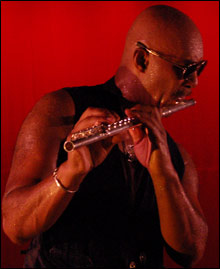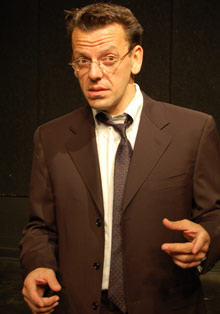
COMING UP FOR AIR: A polymorphously satisfying one-music-man show.
|
Stan Strickland doesn’t play an instrument; he is an instrument, humming, scatting, singing, moaning, and slapping all manner of patty-cake on his person as he dances from flute to sax to clarinet to percussion to keyboard in his polymorphously satisfying one-music-man show Coming Up for Air — An Autojazzography (at the Boston Center for the Arts through October 14). A long-time fixture on the local jazz scene, Strickland has collaborated with writer and director Jon Lipsky, who helped him lay down a libretto to support the rhythmic odyssey that has been his life. The 80-minute piece, a precise framework for Strickland’s musical homage and improvisation, is anchored by a harrowing experience he had 15 years ago, when a couple of rogue waves took him violently under while he was swimming off the coast of Hawaii. The cliché is that your life flashes before your eyes; in Strickland’s case, I’d be willing to bet it also flashed before his ears.
Strickland appears before us barefoot, standing on a piano bench before a shimmering, wavelike backdrop and playing his flute like a Pied Piper for all ages, beckoning us to follow him from an orphan childhood dominated by a religious but loving grandmother and musical “next of kin” John Coltrane to that near-fatal experience in Hawaii — which cracked his neck and teeth and caused him to nearly bite his tongue in two. Anathema for a horn player, the trauma left him with a still-present sprightly sibilance detrimental to the pronunciation of his “s”-sprinkled name.
Mischief, spirituality, lust, exaltation, and pain bounce off one another as Strickland takes us on a Michael-Ondaatje-meets-Bobby-McFerrin journey from an Ohio childhood rooted in work songs and spirituals to an Indian ashram to the top of the Hawaiian volcano where he, girlfriend Isis, and musical collaborator Chief made sacrifices in the hope of reclaiming Isis’s crazy, lost musician brother. Along the way, Strickland offers music ranging from Coltrane’s penetrating “Wise One” to a “Precious Lord” that pours a cappella ornamentation onto pure emotion to an “Earth Angel” borne on sensual high-school memory. Holding on to his neck as he recalls the agonizing recovery from his injuries, Strickland is swaddled in music even in extremis. “Moaning,” he says, “is the only thing that kept me from going under.” And he turns that expression of physical pain into an improvisation that hovers amid jazz and chant.
Certain reminiscences reappear like leitmotifs in Strickland’s performance, among them a gustatory memory of his grandmother’s cobbler (served up before she saved him from his first near-death experience). “Must be good,” the pleased old lady said. “Stanley’s smacking.” Well, this critic’s smacking. Coming Up for Air lets the less talented among us in on a visceral understanding of what it’s like to be immersed in a gift.
ADVERTISEMENT
 |

THOM PAIN: Samuel Beckett for the Jon Stewart generation.
|
The New York Times called Will Eno, the Lowell-bred author of Thom Pain (based on nothing), “a Samuel Beckett for the Jon Stewart generation.” The Gray Lady has a point. Beckett would never resort to some of the theatrical huckstering in Thom Pain, but the Pulitzer-nominated 60-minute monologue, the inaugural offering of New Repertory Theatre’s Downstage @ New Rep (at the Arsenal Center for the Arts through October 22), is reminiscent of Krapp’s Last Tape without the antiquated mixed media. The title character is younger and more nondescript, his reminiscence less elegiac. But Thom Pain’s spare, unsparing, and disjointed tale — held together only by language, words and phrases going off like firecrackers in the dark — is similarly corrosive. And the character is so alienated from himself that much of it is told in the third person, in a manner between stand-up and victim-impact statement.
Thom Pain begins in the dark; some scurrying is heard, a cigarette is lit, and a man appears crouched at the top of the 86-seat black box, quoting from his only possession, a dictionary turned to the page where “fear” is catalogued. Despite a few flipped switches, some half-remembered jokes, and an upbeat burst at the end, things don’t lighten up much. Pain tells us of a “cowboy-suited” boy whose dog was electrocuted, a stranger to tenderness who “came and went like an immigrant to the place where he was born.” There is a vivid memory of a painfully misunderstood encounter with bees. There are several returns to a love affair that, ending, left the character more inchoate and bereft than before. “I disappeared inside her, and she, wondering where I went, left.” Oh, and there is the raffle — a tease, as it turns out, whose absence, Pain points out, at least keeps us all from being losers. Although, as he also points out, we’re no different from him: groping blindly for the reins of this “dead horse of a life we beat.”